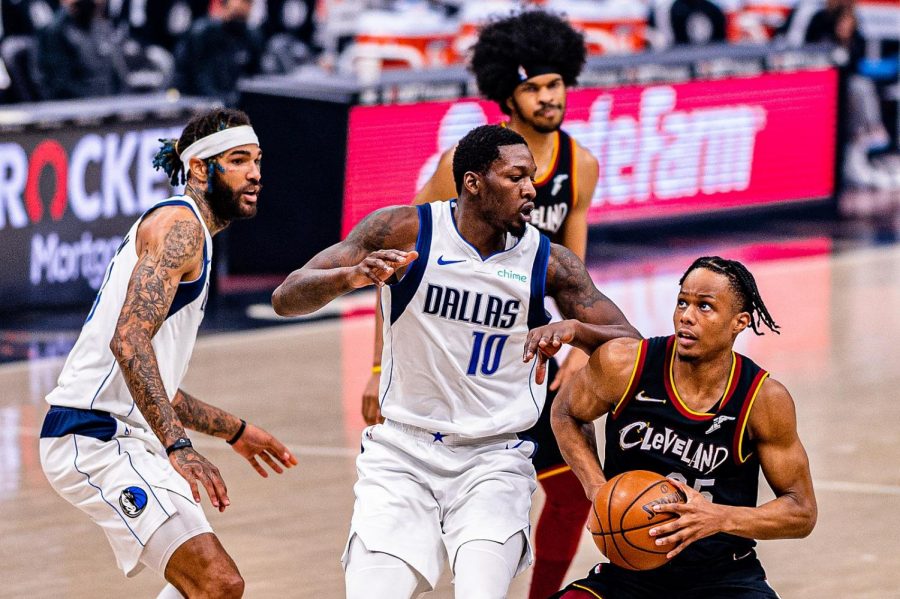NBA Won’t Mandate Vaccine for 2021-22 Season
October 7, 2021
As fall gradually trickles in, basketball is back and running. But as the pandemic continues to consume the world, the sport is yet to fully rebound from last year’s atypical season.
For the NBA’s 2021-22 season, the league announced last Tuesday that it won’t require players to get vaccinated, despite the remaining 10% of players who are doubtful of the vaccine. Consequently, the league may risk calling more timeouts to its season.
As the NBA attempts to fully vaccinate its league, the National Basketball Players’ Association (NBPA) remains strongly opposed to the proposals. As a result, unvaccinated players should anticipate a far stricter season than the vaccinated. “There are still going to be a number of players who are going to have to play this season under very different protocols [and] guidelines than their teammates,” sports reporter Adrian Wojnarowski said on ESPN following the league’s announcement. These strict protocols for the unvaccinated follow two years’ worth of mask-wearing, nasal-swabbing, and constant quarantining. Consequently, their new norm will now consist of more regular testing on practice, travel, and game days, seven-day quarantines, and strict separation between vaccinated and unvaccinated teammates. Yet, through all the COVID-19 ruckus, these “non-starters” are relentless when it comes to the topic of vaccination.
According to Sportico, weeks after the mandate was challenged, two of America’s most advanced cities, New York and San Francisco, initiated a vaccine requirement for its NBA teams with potential medical and religious exemptions.
Not only will there be strict COVID-19 policies set in place for the unvaccinated, but they will also face repercussions concerning their playing time and pay. As stated by CBS Sports, unvaccinated players that play for these two cities will be prohibited from playing home games and will also jeopardize their pay for every game spent on the sideline.
One of the greatest stars of the NBA and New York, the Brooklyn Nets guard Kyrie Irving, notorious for his unorthodox beliefs, will have to wrestle between getting vaccinated for the sake of his team’s health and the future of his own career, or remaining true to his conspiracies. If he chooses to remain unvaccinated, Irving would lose $300K for every game that he sits out, NBA reporter Marc Stein told CBS. Many other players, like Golden State Warriors forward Andrew Wiggins, are stuck in the same position, attempting to get exempted for personal or religious reasons. But the league won’t budge. If pressure from those around Irving and Wiggins can drive the superstars toward getting their shots, they could serve as the start of a ripple effect for the rest of the 10%.
While not all NBA players will be required to get vaccinated due to the Players Association’s refusal, anyone else associated with the league—including coaches, team personnel, and game officials—are required to get vaccinated by October 1st. Per the league’s release statement, any unvaccinated referee, who is not exempt, will be forbidden to referee games. The league’s personnel and team employees, as well as those who routinely interact with the players, must also be vaccinated by October 1st, or risk their positions.
Tenafly Girls Varsity Basketball player Alex Yanowitz (’23) strongly disagrees with the NBA’s decision. “If [the players] get COVID and spread it to the team, then they will have to quarantine,” Yanowitz said. If the unvaccinated contract the virus, this will not only affect them and their team, but will also “put a halt to the season,” she said. However, as a fan of the NBA, she feels comfortable attending games, especially given the New York City vaccine mandate, and is excited for the season to roll back in.
With the bulk of the league’s players vaccinated, the NBA hopes that close to all of its players will get vaccinated as well, so that this season might resemble those of the pre-pandemic era.

















































































































































